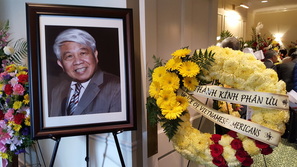Kim O'Connell
 An arrangement at the funeral of Mr. Nguyen Ngoc Bich, March 12, 2016. An arrangement at the funeral of Mr. Nguyen Ngoc Bich, March 12, 2016. It’s an odd feeling, being a stranger to your own heritage, but that’s a feeling I’ve had most of my life. I am the daughter of an American father and a Vietnamese mother. My parents met during the war, when my father was a U.S. Army captain stationed on the base at Okinawa, Japan, where my mother had been hired to teach Vietnamese to U.S. soldiers. After a brief and passionate courtship, they married on Okinawa and moved back to the States. Unfortunately, they divorced in 1977, and my newly single father was awarded custody of my young brother and me. Thus, I grew up fully immersed in American customs, eating burgers and hot dogs, going to public school, and hanging out at the mall. It didn’t help that I was tall and white-skinned, with medium-brown hair, wholly resembling my Irish-American father. I didn’t look like my Vietnamese mother at all. Even in those times when I was with my mother, when we would cook spring rolls together or visit the Vietnamese shops at Eden Center in Falls Church, Virginia, I never felt very Vietnamese. As a child, that didn’t matter that much to me. But as I got older, I began to desire a stronger connection to my Vietnamese heritage. Without that connection, it felt like I was always standing on one leg. I sought to learn more about Vietnam and the experiences of people in the Vietnamese community. When I was in graduate school at Goucher College, studying historic preservation, I began to research and write about the section of Arlington, Virginia, that had been settled by Vietnamese immigrants and refugees after the fall of Saigon and was eventually known informally as “Little Saigon.” It didn’t take long for this work to lead me to meet Mr. Nguyen Ngoc Bich, whom I interviewed for my graduate school paper, as well as several other members of the local Vietnamese community. We sat in Mr. Bich’s basement, surrounded by his voluminous books, photos, and papers, as he told me about his many experiences in Arlington, working for the School Board and other entities in several capacities that served the local Vietnamese population. He was an author, translator, educator, community spokesperson, lobbyist, and so much more. But most of all, I remember being impressed by his warmth, intelligence, and generosity. Then, in 2004, Mr. Bich and I came together again to film a segment about Arlington’s Little Saigon for a PBS (WETA) documentary called “Arlington: Heroes, History, and Hamburgers.” Again, Mr. Bich was a sensitive, authoritative figure who offered meaningful insights about this essential time in Virginia history. His warm smile was, to me, the highlight of the segment. When I was with him, he made me feel accepted as a member of this community too. He gave me permission to stand on both legs. Some time passed, but with the 40th anniversary of the fall of Saigon in 2015, interest in commemorating Arlington’s unique Vietnamese heritage--particularly recognizing Little Saigon as the first place of refuge for Vietnamese in Virginia after the war--was growing within county government. I was honored to work with representatives from the community as well as Arlington’s historic preservation, cultural affairs, and public art departments, along with gifted students from Virginia Tech, to recognize the beginning of Vietnamese resettlement in this area. It was essential that Mr. Bich be a part of this burgeoning effort. It was a real pleasure to introduce him at a commemorative event that recognized this history through the collection of oral histories and an audio tour of the former Little Saigon, as well as a public art installation. (Mr. Bich himself recorded an oral history interview that has now been transcribed and is available to researchers at the Arlington Public Library’s Center for Local History.) This year, we were about to start work together yet again on a booklet about Arlington’s Vietnamese heritage, funded with a grant from the Virginia Foundation for the Humanities. Mr. Bich was to be an expert scholar on this project, and I was so pleased when he attended the kick-off meeting for this effort in January 2016. It was a shock to receive the news that Mr. Bich had passed away only about a month later. Mr. Bich’s passing is a huge loss to the Vietnamese community, as well as to the community of educators, students, historians, activists, and scholars that he has influenced both here in America as well as in Vietnam and other parts of Southeast Asia. It is also a huge loss to me personally. Mr. Bich was a generous mentor and friend who showed me what it means to be Vietnamese. Just as he helped so many people to find and hold onto their own history, Mr. Bich helped do the same for me. Comments are closed.
|
Kim A. O'ConnellThoughts on writing, travel, people, and places. Categories
All
Archives
January 2019
|
 RSS Feed
RSS Feed